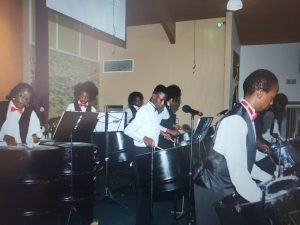Introduction to Ministry Context
National Wesleyan Church (NWC)is a predominantly Afro Caribbean/African congregation located in the City of Hyattsville, MD, approximately one mile outside the Nation’s Capital, Washington DC. The majority of the congregants originate from the Caribbean Islands, Guyana, and at least eight African countries. About four years ago, we launched a Hispanic ministry and hired a Hispanic Pastor. Two years ago, we launched the Baltimore campus, and that congregational is comprised of an African American population. About sixty-two percent (62%) of our congregants are fifty and older.
At the main campus in Hyattsville, weekly attendance Pre-COVID average approximately 200 congregants per Sunday. We share a unique, diverse heritage and one of the few black churches within the Wesleyan denomination. The majority of our congregants share no previous relationship with the Wesleyan Church. Additionally, the religious backgrounds are so varied we can best be described as a chopped salad, as opposed to a smoothie.
Two other unique outreach features of our church are our Steelpan and Immigration Connection Ministries. The Steel Pan Ministry provides opportunities for the entire family to play a unique musical instrument indigenous to Trinidad and Tobago. The Immigration Connection, Ministry is an authorized service of the Immigration & Naturalization Service, providing professional immigration services to the community at significantly lower rates than offered by lawyers.
Explanation of the Project
Kärkkäinen and others discussed the complexity associated with understanding the role and function of the Holy Spirit within the church. Kärkkäinen noted, “No single translation captures the complexity of the functions assigned to the Paraclete”[1] Clark Pinnock, speaking about the Holy Spirit, commented, “it is a difficult subject.” Still, he adds this critical point to the subject of God, The graciously given presence of His Spirit is surely the most wonderful thing one experiences… Given the inherent complexity of the Subject, it would be unwise for any of us to deny our need to grow as hearers of the Word of God in this matter.[2]
The Problem
The Spirit is the “Giver of Life”[1] (Gen 1:2). The Spirit also brings forth and nurtures life, keeps all things connected and constantly renews.”[2] The Holy Spirit holds a unique place in Christianity. The work of the Holy Spirit is present in every aspect of God’s mission to create, redeem, reconcile, and perfect God’s creation.”[3]Neglect of the Spirit can occur in the pulpit and as well in the pews. In this research project, I examined Neglected Presence investigating traditions and rituals that inhibit the experience of the Holy Spirit. My research led me to the notions of prayer and prayerlessness, pastoral and leadership authority that subtly neglect and subvert the activity of the Holy Spirit. Wesley’s theology was also investigated since Wesley’s theology portends complexity regarding the Holy Spirit, grace, entire sanctification, and perfect love.
Prayer/Prayerlessness
We must acknowledge that prayer is difficult, and many people struggle with prayer. Prayer is relational with God, requiring communication often through speech, and one “can’t create or sustain an ongoing intimate relationship without speech.”[4]However, there is another dimension of prayer that involves the Spirit. Laytham further expressed Jesus, the “preeminent pray-er,”[5] relies on the power of the Spirit to pray, and believers ought to emulate His practice.
Confusing Fear with Authority
Sometimes pastors and leaders become fearful about the actions of the Spirit. Rather than yield to the Spirit, they find excuses to neglect the Spirit. In my pastoral interviews, Some of these pastors voiced fears regarding the chaos the Spirit may bring, so they restore to neglecting the Spirit. Veli Kärkkäinen stated, “The church’s ambiguous experience with charismatic and prophetic movements has often led the leadership of the church to try to control the work of the Spirit out of fear of chaos and lack of order.”[6]
Research Methodology
The aspect of neglect through tradition and ritual is integral to my research project and my interest in literary information written over several decades. As a result, my project information and inferences originate from literary reviews, including the reliance upon exegesis and practical experience.
Furthermore, my literary sources include scholarly books, journals, biblical text, statistical data (from Pew and Barna Research)[7], and five pastoral interviews. The five pastoral interviews for this project, with their contemporary realities, were vital to my project. Their experiences confirmed some of the information included in my literary research. The rationale for these interviews included gauging the current state of congregations in this matter of “Neglected Presence.”
Interpretation Findings and Findings
Prayer and Prayerlessness

Photo by James Coleman on Unsplash
Meaningfully communication and healthy relationships go together. Conversely, when communication is cut off (neglected) completely or diminished, there can’t be an ongoing relationship.”[8] The statistical data gathered from Pew Research indicating between 1993 and 2014, twenty-nine percent (29%) in daily prayer by Americans suggest a declining percentage of Americans and the people of God who claim to pray daily. The declining interest in prayer is symptomatic of a relational problem the people of God share with the Lord. Congar, indicated “to pray is not to extend our desire and our request to a superior being more capable than we are of fulfilling them, but to let our desire be transformed, to let God’s will become ours.”[9] “We tend our relationship by attending to prayer, whether prayer is a matter of words spoken or heard or simply a matter of showing up.”[10] We can catch the Spirit through Spirit-led prayer and develop intimacy with God.
Fearful but Trusting
Sometimes neglect is not always visible.
We pray for God’s direction in our services. Yet, our pastor and leaders deny their congregants the complete experience with the Giver of life, the Spirit that nurtures both individuals and the community. As pastors, we must reflect upon actions of neglect and try to assist in the impact on our communities in catching the fulness of the Spirit.
[1] Andrew Gabriel, “Pneumatological Perspectives for a Theology of Nature: The Holy Spirit in Relation to Ecology and Technology”, Journal of Pentecostal Theology 15, no. 2 (2007) p. 195
[2] Ibid, p. 198
[3] Victor I. Ezigbo, Holy Spirit, (Lutterworth Press, 2013), p. 190
[4] William Phillip, Why we Pray, (Crossway, Wheaton, IL 2015) p. 23
[5] Ibid, p. 28
[6] Veli-Matti Kärkkäinen, Pneumatology: The Holy Spirit in Ecumenical, International, and Contextual Perspective (Baker Publishing Group 2018), p. 7.
[7] Pew and Barna Research groups were my primary sources. Other sources are identified.
[8] William Phillip, Why we Pray, (Crossway, Wheaton, IL 2015) p. 31
[9] Etienne Veto, “ Praying in the Hay Spirit Spirituality and Pneumatology”, New Blackfriars, (2016), p.163
[10] Martha Stortz, “Purpose-Driven or Spirit-Led: A Spirituality of Work or the Work of the Spirit? Word & World 25, no. 4 (2005), p. 411
[1] Veli-Matti Kärkkäinen, Pneumatology: The Holy Spirit in Ecumenical, International, and Contextual Perspective (Baker Publishing Group), p. 8.
[2] Clark Pinnock, “The Recovery of the Holy Spirit in Evangelical Theology,” JPT 13, no. 1 (2004), p. 4


